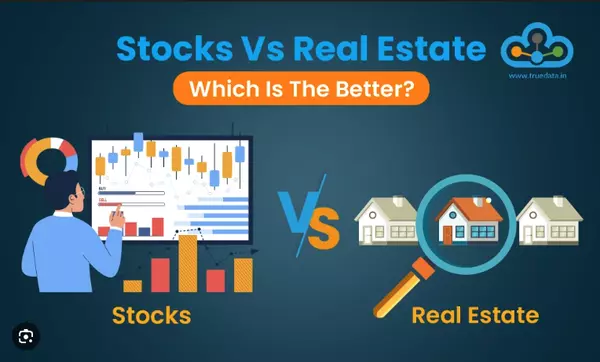The Fundamental Differences Between Stocks and Investment Real Estate
Introduction: Two Paths to Building Wealth
When it comes to building long-term wealth, two giants dominate the conversation: stocks and real estate. Both can create financial freedom, but they work in completely different ways. Understanding how each operates is more than academic. It can shape how you approach money, risk, and independence.
So, which is truly better? The truth is, they both have incredible potential, but for very different reasons.
Understanding the Basics
Before comparing them, let’s make sure we’re speaking the same language.
What Are Stocks?
A stock represents ownership in a company. When you buy shares of Apple or Tesla, you own a small piece of that business. If the company grows, your shares appreciate in value. You might also receive dividends, which are your share of the company’s profits.
Stocks trade on public exchanges like the NASDAQ or TSX, where prices change every second. They’re liquid, fast-moving, and for some investors, addictive.
What Is Investment Real Estate?
Investment real estate is physical property purchased primarily to generate income and appreciate over time. You earn through rent, property value growth, and tax advantages.
Unlike stocks, real estate is tangible. You can touch it, live in it, or improve it. It also offers one major tool that stocks rarely do: leverage.
Ownership and Control
Passive Ownership in Stocks
Owning stocks is like being a silent partner in thousands of companies. You don’t control the decisions; the executives do. Your only power is buying or selling shares.
That’s both the beauty and the downside. You can profit massively from other people’s success, but you have zero say in how it happens.
Active Management in Real Estate
Real estate gives you control. You decide what to buy, when to renovate, how to price rent, and when to sell. Your choices directly affect your outcome.
This level of control can turn an average property into a goldmine or a money pit if mismanaged.
The Power of Leverage in Property Ownership
With a 20 percent down payment, you control 100 percent of the asset. For example, $100,000 can purchase a $500,000 property. If that property appreciates 5 percent, your $100,000 investment grows 25 percent.
That’s leverage, and it’s one of the main reasons real estate can outperform stocks long term.
Income Generation: Dividends vs. Cash Flow
Dividends from Stocks
Dividends are paid by companies that share profits with investors. Some offer solid yields of 3 to 5 percent, while others reinvest profits to grow. Dividend income is passive, but it can change with market conditions or corporate priorities.
Rental Income and Other Property Returns
Real estate pays you monthly through rents, which you can adjust over time. Smart investors also add income through parking, storage, or short-term rentals.
Unlike dividends, you can influence your income. Renovate a kitchen, raise rent, and your property’s cash flow and value both rise. No stock allows that kind of control.
Growth Potential and Appreciation
Market-Driven Stock Growth
Stock prices move based on company performance, investor sentiment, and global trends. Historically, the S&P 500 delivers about 9 to 10 percent per year before inflation. But those returns come with volatility and emotional swings.
Forced Appreciation in Real Estate
In real estate, you can force appreciation by improving the property. Remodel a dated home, add a suite, or increase rent. Suddenly it’s worth more.
You’re not just waiting for the market to move; you’re creating value through action.
Leverage and Financing
Borrowing in the Stock Market
Margin accounts let investors borrow money to buy more stocks, but it’s risky. If prices drop, you can face a margin call, forcing you to sell at a loss.
For most investors, leverage in stocks is a double-edged sword: powerful but dangerous.
Using Debt to Multiply Returns in Real Estate
Debt is normal in real estate. Mortgages let you control expensive assets with a small initial investment. As tenants pay rent, they also pay down your loan, building your equity.
Used responsibly, real estate leverage can feel like compound growth on steroids.
Risk Factors and Volatility
The Psychological Rollercoaster of Stocks
Stock prices can move wildly, sometimes 5 percent in a single day. That volatility plays with human emotions. Many investors sell too soon or panic during downturns, hurting their returns.
It’s simple to trade stocks but difficult to stay emotionally steady.
Real Estate Risks: Tenants, Maintenance, and Market Shifts
Real estate isn’t risk-free. You might face bad tenants, unexpected repairs, or vacancies. And while values tend to rise over time, local markets can stagnate.
The difference is that you can mitigate most real estate risks through management, screening, and insurance.
Liquidity and Accessibility
How Quickly Can You Sell?
Stocks win here easily. You can sell them in minutes and get cash almost instantly. That liquidity gives flexibility, but it can also tempt you to make impulsive moves.
The Illiquidity Trade-Off in Real Estate
Selling a property takes time. It’s slower and requires more effort, but that illiquidity can be a hidden advantage. It forces long-term discipline and prevents panic selling. Real wealth rewards patience.
Tax Advantages and Write-Offs
Tax Treatment of Stock Investments
Stocks are straightforward: you pay capital gains tax when you sell for profit and dividend tax on earnings. There are limited deductions unless you invest through a corporation or fund.
Real Estate’s Hidden Tax Benefits
Real estate investors can deduct interest, maintenance, insurance, and property taxes from their income. This can drastically reduce taxable profits and increase net returns.
Depreciation: The Non-Cash Gold Mine
Depreciation allows you to claim a paper loss each year, even while your property increases in value. It’s one of real estate’s biggest advantages because it shelters income without costing cash.
Inflation Protection
Stocks and Inflation: A Mixed Relationship
Stocks can outpace inflation over the long run, but during high inflation, profit margins can shrink. That can make stock prices drop even when everything else gets more expensive.
Real Estate as a Physical Hedge Against Inflation
Real estate usually rises with inflation. As prices climb, so do rents. Your mortgage stays fixed while your income grows, which means your real debt gets smaller. Owning property during inflation is like holding an anchor while the storm passes.
Time Commitment and Management Effort
Set-and-Forget Investing in Stocks
Stocks require very little effort. You can invest through index funds or ETFs, automate contributions, and check once a year. It’s as close to passive as investing gets.
Hands-On Work in Real Estate
Real estate takes effort. You deal with tenants, maintenance, taxes, and occasional headaches. But you can outsource most of it with property managers.
Think of real estate as a business that pays you for being smart and organized.
Emotional and Behavioral Factors
Investor Psychology in Stocks
The stock market is a test of patience and discipline. Many investors lose money not because of bad investments, but because of bad timing driven by fear or greed.
Real Estate’s Tangible Comfort
Real estate feels solid. You can see it, improve it, and walk inside it. Even when the market dips, that physical presence provides emotional stability many investors crave.
Long-Term Wealth Building
Compounding in the Stock Market
Stocks build wealth through compounding. Reinvest dividends, stay consistent, and time does the heavy lifting. It’s quiet, slow, and powerful.
Equity Growth in Real Estate
In real estate, your equity grows from three sources: mortgage paydown, appreciation, and rental profit. Over decades, that combination creates life-changing wealth.
Which One Fits You?
Investor Personality Types
If you want simplicity, liquidity, and low effort, stocks are a great fit.
If you value control, leverage, and tangible assets, real estate might be your lane.
It’s not about right or wrong. It’s about which vehicle fits your mindset.
Blending Both for a Balanced Portfolio
The smartest investors combine the two. Stocks give liquidity and passive growth. Real estate provides control, cash flow, and tax benefits. Together, they form a strong, diversified foundation.
Conclusion: The Two Engines of Wealth
Stocks and real estate are like the gas and electric engines of your wealth vehicle. Each powers growth in a different way.
Stocks reward patience and consistency. Real estate rewards initiative and management.
The real power comes from owning both. Use stocks to build passive wealth and real estate to create income and control. That’s how you build real financial independence.
FAQs
1. Which offers better returns, stocks or real estate?
Historically, stocks average about 9 to 10 percent annually, while real estate often matches or exceeds that when you include leverage and rental income.
2. Is real estate riskier than stocks?
It depends on management. Stocks carry market volatility, while real estate has operational risks like maintenance and vacancies.
3. Can I invest in both at the same time?
Yes. Diversifying between the two creates balance and smoother long-term growth.
4. How much money do I need to start in real estate?
With a 20 percent down payment and solid credit, you can get started with much less than most people think.
5. Which protects better against inflation?
Real estate usually wins. Fixed-rate debt combined with rising rents and property values makes it a strong inflation hedge.
Categories
Recent Posts










GET MORE INFORMATION

Agent
